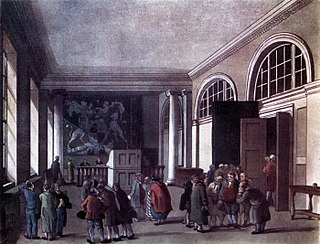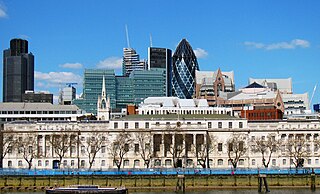
Customs is an authority or agency in a country responsible for collecting tariffs and for controlling the flow of goods, including animals, transports, personal effects, and hazardous items, into and out of a country. Traditionally, customs has been considered as the fiscal subject that charges customs duties and other taxes on import and export. In recent decades, the views on the functions of customs have considerably expanded and now covers three basic issues: taxation, security, and trade facilitation.

HM Customs and Excise was a department of the British Government formed in 1909 by the merger of HM Customs and HM Excise; its primary responsibility was the collection of customs duties, excise duties, and other indirect taxes.
Free economic zones (FEZ), free economic territories (FETs) or free zones (FZ) are a class of special economic zone (SEZ) designated by the trade and commerce administrations of various countries. The term is used to designate areas in which companies are taxed very lightly or not at all to encourage economic activity. The taxation rules and duties are determined by each country. The World Trade Organization (WTO) Agreement on Subsidies and Countervailing Measures (SCM) has content on the conditions and benefits of free zones.

In chemistry, pi bonds are covalent chemical bonds, in each of which two lobes of an orbital on one atom overlap with two lobes of an orbital on another atom, and in which this overlap occurs laterally. Each of these atomic orbitals has an electron density of zero at a shared nodal plane that passes through the two bonded nuclei. This plane also is a nodal plane for the molecular orbital of the pi bond. Pi bonds can form in double and triple bonds but do not form in single bonds in most cases.

Taxation in the United Kingdom may involve payments to at least three different levels of government: central government, devolved governments and local government. Central government revenues come primarily from income tax, National Insurance contributions, value added tax, corporation tax and fuel duty. Local government revenues come primarily from grants from central government funds, business rates in England, Council Tax and increasingly from fees and charges such as those for on-street parking. In the fiscal year 2014–15, total government revenue was forecast to be £648 billion, or 37.7 per cent of GDP, with net taxes and National Insurance contributions standing at £606 billion.

In chemistry, sigma bonds are the strongest type of covalent chemical bond. They are formed by head-on overlapping between atomic orbitals. Sigma bonding is most simply defined for diatomic molecules using the language and tools of symmetry groups. In this formal approach, a σ-bond is symmetrical with respect to rotation about the bond axis. By this definition, common forms of sigma bonds are s+s, pz+pz, s+pz and dz2+dz2 . Quantum theory also indicates that molecular orbitals (MO) of identical symmetry actually mix or hybridize. As a practical consequence of this mixing of diatomic molecules, the wavefunctions s+s and pz+pz molecular orbitals become blended. The extent of this mixing depends on the relative energies of the MOs of like symmetry.
In finance, a surety, surety bond or guaranty involves a promise by one party to assume responsibility for the debt obligation of a borrower if that borrower defaults. Usually, a surety bond or surety is a promise by a surety or guarantor to pay one party a certain amount if a second party fails to meet some obligation, such as fulfilling the terms of a contract. The surety bond protects the obligee against losses resulting from the principal's failure to meet the obligation. The person or company providing the promise is also known as a "surety" or as a "guarantor".

A duty-free shop is a retail outlet whose goods are exempt from the payment of certain local or national taxes and duties, on the requirement that the goods sold will be sold to travelers who will take them out of the country. Which products can be sold duty-free vary by jurisdiction, as well as how they can be sold, and the process of calculating the duty or refunding the duty component.
A bonded warehouse, or bond, is a building or other secured area in which dutiable goods may be stored, manipulated, or undergo manufacturing operations without payment of duty. It may be managed by the state or by private enterprise. In the latter case a customs bond must be posted with the government. This system is widely used in developed countries throughout the world.

Green Spot is a single pot still Irish whiskey, produced specifically for Mitchell & Son of Dublin by Irish Distillers at the Midleton Distillery in Cork, Ireland. Green Spot is one of the few remaining bonded Irish whiskeys. Along with Mitchell's three older offerings, Yellow Spot, Red Spot, and Blue Spot. It is one of only four whiskeys specifically produced for and sold by an independent wine merchant in Ireland.

His or Her Majesty's Excise refers to 'inland' duties levied on articles at the time of their manufacture. Excise duty was first raised in England in 1643. Like HM Customs, the Excise was administered by a Board of Commissioners who were accountable to the Lords Commissioners of the Treasury. While 'HM Revenue of Excise' was a phrase used in early legislation to refer to this form of duty, the body tasked with its collection and general administration was usually known as the Excise Office.

In July 1906, the city of Dundee was the site of a large fire caused by the ignition of a bonded warehouse. The fire, which burned for 12 hours, has been described as the most destructive fire in the history of Dundee. The fire was described by an eyewitness as sending "rivers of burning whisky" through the city.
The United States imposes tariffs on imports of goods. The duty is levied at the time of import and is paid by the importer of record. Customs duties vary by country of origin and product. Goods from many countries are exempt from duty under various trade agreements. Certain types of goods are exempt from duty regardless of source. Customs rules differ from other import restrictions. Failure to properly comply with customs rules can result in seizure of goods and criminal penalties against involved parties. The United States Customs and Border Protection (CBP) enforces customs rules.

The Custom House, on the north bank of the Thames in the City of London, is a building which was formerly used for the collection of customs duties. A custom house has been present in the area since the 14th century, and a building on its current site has been rebuilt on a number of occasions. Today the Custom House is used by Her Majesty's Revenue and Customs. The address is 20 Lower Thames Street, EC3. Custom House is neighboured on the waterfront by Sugar Quay to the east and Old Billingsgate Market to the west.

Shanghai Free-Trade Zone, officially China (Shanghai) Pilot Free-Trade Zone, is a free-trade zone in Shanghai, China. On 22 August 2013, the State Council approved the establishment of the zone. Officially launched on 29 September 2013 with the backing of Chinese Premier Li Keqiang, it is the first free-trade zone in mainland China and covers an area of 240.2 square kilometres (92.7 sq mi). Shanghai FTZ integrates four existing bonded zones in the district of Pudong—Waigaoqiao Free Trade Zone, Waigaoqiao Free Trade Logistics Park, Yangshan Free Trade Port Area and Pudong Airport Comprehensive Free Trade Zone.
A bonded logistics park is a type of special economic zone. Trade arrangements are similar to that of a bonded warehouse but over a specific geographic area. Sometimes with international port capabilities. Goods may be stored, manipulated, or undergo manufacturing operations without payment of duty.

Daly's Distillery was an Irish whiskey distillery which operated in Cork City, Ireland from around 1820 to 1869. In 1867, the distillery was purchased by the Cork Distilleries Company (CDC), in an amalgamation of five cork distilleries. Two years later, in 1869, as the smallest CDC distillery, Daly's Distillery ceased operations. In the years that followed its closure, some of the buildings became part of Shaw's Flour Mill, and Murphy's Brewery, with others continuing to be used as warehouses by Cork Distilleries Company for several years.

The Argyle Stores is a heritage-listed former custom house and bond store that now serves as offices, bar, function rooms and restaurant located at 12-20 Argyle Street in the inner-city Sydney suburb of The Rocks in the City of Sydney local government area of New South Wales, Australia. Henry Cooper designed the east wing, and the designer of all other wings is not known. The Argyle Stores were built from 1826 to 1878, and is also known as Argyle Bond Stores and Cleland Bond Store. The property is owned by Property NSW, an agency of the Government of New South Wales. It was added to the New South Wales State Heritage Register on 10 May 2002.

The Union Bond Store is a heritage-listed former warehouse, bond store and Westpac bank branch and museum located at 47 George Street in the inner city Sydney suburb of The Rocks in the City of Sydney local government area of New South Wales, Australia. It was designed by John Bibb and built from 1841 to 1842. It is also known as Union Bond Store (former) and Westpac Bank. The property is owned by Property NSW, an agency of the Government of New South Wales. It was added to the New South Wales State Heritage Register on 10 May 2002.













